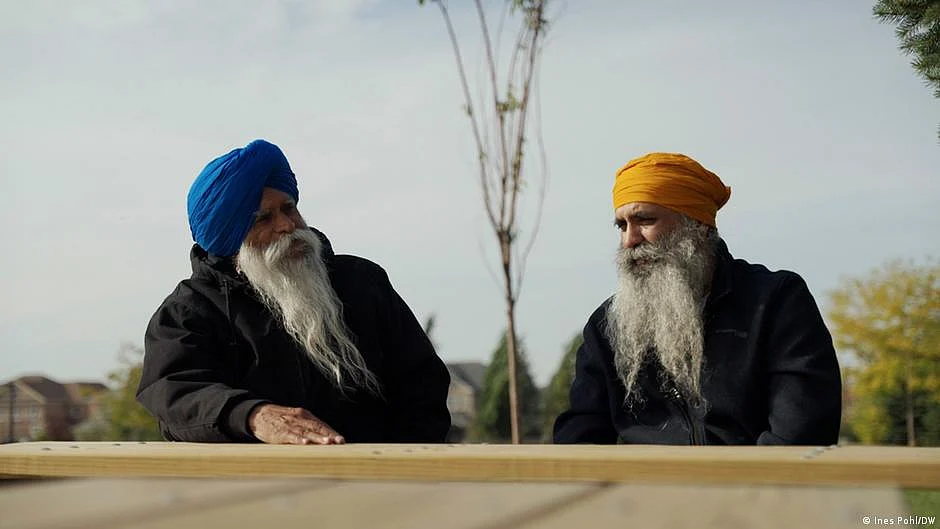Canada's Sikhs under pressure amid row with India
The Indian community in Canada is more divided after Ottawa said Indian agents were behind the murder of a Sikh activist three months ago

For decades, Canada was a safe haven for Sikhs. Many left their native India in the 1980s and '90s after thousands died there during armed struggles for an independent Sikh state called Khalistan. Nearly 800,000 Sikhs live in Canada today, the largest community outside India.
While the Sikh separatist movement is hardly visible in India anymore, it is still very much alive within the diaspora in Canada. The relationship between India and Canada has been tense for many years because of this.
Since Canadian Prime Minister Justin Trudeau declared last week that his government had "credible allegations" that the Indian government was behind the murder of a Sikh activist with a Canadian passport and on Canadian soil, the situation has come to a head.
After Trudeau's statement, India suspended visa processing for Canadian citizens. Indian Foreign Ministry has dismissed Canada's accusation as "absurd."
Supporters of the Khalistan movement emboldened
Sikh protests regularly take place in front of India's Consulate General on Bloor Street at Hazeldean Park in Toronto.
Some of the demonstrators are demanding the closure of the diplomatic mission, while calling on the government in Ottawa to take even tougher action against the Indian government.
Sunmeet Kaur is a Sikh activist. She spoke to DW at her home in Brampton, a western Toronto neighborhood with a large Indian population. "If the Indian government can play a role in killing a Canadian on Canadian soil for standing up for his [Sikh] homeland, then you can only imagine how Punjabis living in India under India's oppressive regime feel about what they have to go through on a daily basis."
India's Sikhs live concentrated in the northwestern state of Punjab. Of the state's 28 million inhabitants, almost 60% are members of the Sikh community.
"If you can't exercise your fundamental right to free speech in Canada, and you're not protected, that's a big problem, not just for Canada, but for all democracies," Kaur added.
The Sikh "Khalistan" movement calls for an independent Sikh homeland in Punjab. The Indian government considers the movement and its adherents as constituting "terrorism."
Sikhs feel pressure amid diplomatic row
Kuljeet Singh, also a Sikh activist, leaves no doubt that many members in the Sikh community are willing to sacrifice their lives in the fight for an independent state in India.
"We know that our struggle for liberation from Indian occupation has always required sacrifice," Singh said.
For his Sikh community, he said, the murdered Hardeep Singh Nijjar "is another sacrifice we will accept if it brings us closer to our goal."
Nijjar was shot dead in June outside a Sikh cultural center in the western Canadian region of British Columbia by unknown masked assailants. His death triggered the diplomatic tension between Canada and India.
Singh admits his positions are radical, and there are many members of the community who are less-politically active.
The Shri Guru Nanak Sikh Centre in Toronto is a second home for Jagdish Songh Sandhu.
Whenever Sandhu finishes his shift as a cab driver, he comes to the Sikh temple to pray, meet friends, and get free food offered around the clock in the building.
"The community helped me a lot in the beginning. They gave me everything: food for my work, food for my family. I could even live here when I didn't have a place to stay. Here I found happiness and inner peace. I can't get that anywhere else," he told DW.
Other members of the Sikh community said that they feel safe in Canada and that all Sikhs would therefore like to live here.
However, after the attack, some Sikhs here said that their entire community and its leaders live in fear that the Indian government might send an assassin after them.
Canadian Hindus fear escalation
Hindus comprise the largest Indo-Canadian community. Around 830,000 members of the religion live in Canada. Guarav Sharma, spokesman for the Canadian Hindu Forum in Toronto, told DW that he is very concerned with the rise of radical sentiments among the Sikh community following the death of Nijjar.
"We don't want the situation to escalate to the point of affecting working conditions or the normal life of the community," he said.
Sharma added that more extremist Sikhs are demanding the Hindu community to leave Canada.
"Prime Minister Trudeau's statement has unfortunately provided a good platform for extremist ideologies."
Canada stands for free speech
Canadians who do not belong to the Indian diaspora told DW that the systems of the two religious communities (Sikhs and Hindus ) are very different, and there must be a right to free speech for every Canadian, no matter where he or she comes from.
However, opinions differ here on whether Trudeau should have provided evidence and intelligence on the violent death of Hardeep Singh Nijjar to substantiate his allegations.
The Indian government has made a similar demand. However, Ottawa remains silent.
A source familiar with the matter told the AP news agency that Trudeau's government had obtained information resulting from surveillance of Indian diplomats in Canada.
In addition, Canada received information from a member of the "Five Eyes" intelligence alliance, which also includes the United States, Australia, Great Britain and New Zealand.
Follow us on: Facebook, Twitter, Google News, Instagram
Join our official telegram channel (@nationalherald) and stay updated with the latest headlines